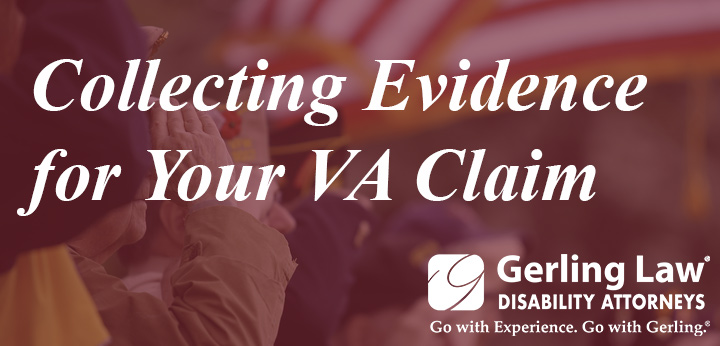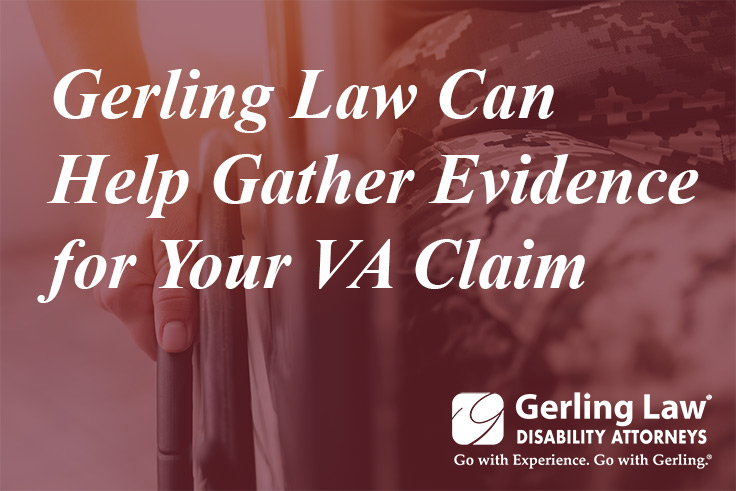
Various types of treatment records may be needed to prove your VA disability claim. The VA will ask you to provide any medical treatment records and/or evidence to substantiate your claims in order to grant service connection.
Gerling Law Attorneys are top-notch. They are an awesome, loving, caring, and family-oriented law firm.
– Dave E.
Although the VA has access to medical or mental health treatment provided to the veteran by the VA, the VA does not have access to any civilian treatment records. At Gerling law we will review evidence and do everything in our power to obtain any evidence the VA is not able to obtain.
TYPES OF EVIDENCE
Medical records
The VA does their best to obtain medical treatment records. The VA has access to records from the VA healthcare system. If a veteran receives any treatment outside of the VA, the VA may have difficulty obtaining the appropriate records. Medical treatment records from other providers may be requested by the VA.
Claims file (C-file)
A C-File contains any or all claims the veteran has filed since their time in the military service. The C-File should also contain any service records and service treatment records. A C-File may also contain all C&P examinations and medical treatment records related to any claims filed by the veteran. Many records may be missing from a C-File so it is important to have your C-File reviewed by an experienced VA attorney.
Doctors reports
Doctors can write reports of why they believe your conditions are service-related. For example, you may have a documented back injury in service. The back injury may also be the cause of your hip, leg, foot and neck problems. A report from a doctor may be able to link all of the conditions to your back injury.
Lay statements
Lay statements can be submitted as evidence to support your claims. Your friends, family members, neighbors, co-workers – anyone in your life – can write them for you as testimony that they have witnessed your conditions and the impact it has on your life, specifically how you were before, during and after the military. These statements are particularly helpful for mental conditions.
Buddy statements
Veterans can use statements from fellow servicemen. Buddy statements are helpful to prove that certain events occurred when you were in service. This could be anything: military sexual trauma, IED, a hazing, enemy attack, proof of foreign service, symptoms from a medical or mental health condition, etc. Buddy statements serve as proof of events that took place that may have no documented evidence in your service record.
Psychological reports
Psychological reports are usable for a VA benefits application. Veterans applying for mental conditions should have a mental health professional write a report detailing the severity of the condition. For example, if a veteran is applying for Total Disability Individual Unemployability benefits, this report should cover why the veteran can’t work due to mental-related conditions.

Specific evidence for specific disability applications
Agent Orange VA Disability Applications
Many veterans may have been exposed to Agent Orange while serving in Vietnam. There are other areas the VA recognizes Agent Orange Exposure such as brown or blue water, Thailand, or the Korean DMZ. Agent Orange exposure can be difficult to prove because many Vietnam veteran records have been lost or destroyed. Old photos can be used to prove veterans served during that era and letters from other service members who served alongside of you.
Contaminated Water at Camp Lejeune
Many veterans who served at Camp Lejeune between August 1, 1953 to December 31, 1987 may be entitled to compensation due to contaminated water. Many conditions are already presumed to be related to toxic chemicals in the drinking water in both residential and training areas.
These conditions already presumed to be related to these toxic chemicals include esophageal cancer, breast cancer, kidney cancer, multiple myeloma, renal toxicity, female infertility, scleroderma, Non-hodgkin’s lymphoma, lung cancer, bladder cancer, leukemia, myelodysplastic syndromes, hepatic steatosis, miscarriage, and neurobehavioral effects.
Individual Unemployability VA Applications
These claims focus on how a veteran cannot work as a result of their service connected disability. This is usually proven in part by a letter from a vocational expert or medical doctor stating that you are no longer able to work because of a disability or a combination of disabilities incurred while in the military.
Mental Conditions on VA Disability Applications
If you suffer from a mental health illness as a result of your time in the military service, it may be necessary to obtain statements from friends and family describing how your behavior changed after your military service to prove mental health problems began during service.
Family or friends who have known you all your life can attest to your difficulties before, during, and after service and how they have impacted your life continuously since you left the military service. This situation is best proven if treatment by a mental health professional backs your claim and prepares a report stating your mental impairments are a result of your military service.
Letters from friends and family are used to confirm the existence of mental issues and the impact these issues have had on your daily life.
If you suffer from a mental health illness as a result of or secondary to pain and limitations caused by your service connected conditions, you should also file a claim as you may be entitled to disability benefits.
PTSD VA Disability Applications
PTSD is proven as a result of an event or stressor that occurred during service. Letters from fellow service members may need to be used prove a traumatic event occurred.
Secondary Service-Connected Conditions on VA Disability Applications
You will have to demonstrate the secondary conditions are related to service-related disability. For instance, you will need to prove that your neuropathy is due to your diabetes. Proving secondary conditions gets tricky and we highly recommend you contact a VA disability attorney to help with this.
Blue Water Navy Vietnam Veterans
Navy veterans who were previously denied claims for Agent Orange related conditions and served on ships located in blue water off the coast of Vietnam between January 9, 1962 and May 7, 1975 may be eligible for compensation.
Beginning January 1, 2020, veterans who served within 12 nautical miles from the shore of Vietnam, or who had served in the Korean DMZ, are presumed to be exposed to Agent Orange. Many of these claims have been previously denied by the VA.
If you are a Navy veteran who served on a ship in blue water off the coast of Vietnam, have our attorneys review your claim to determine if you are eligible for compensation. If you have been denied for any conditions related to Agent Orange and are a veteran who served in blue water off the coast of Vietnam, it is important to refile for your Agent Orange-related conditions that were previously denied.
Gulf War Syndrome/Illness
Veterans who served in Southwest Asia theater of military operations from August 2, 1990 to present and suffer from illnesses or other conditions may be eligible for disability compensation.
Many of these conditions include chronic fatigue syndrome, fibromyalgia, IBS, dyspepsia, abdominal pain syndrome, abnormal weight loss, fatigue, cardiovascular disease, muscle and joint pain, menstrual disorders, headaches, neurological and psychological problems, skin conditions, respiratory disorders, and sleep disturbances.
Veterans during the Gulf War period may have been exposed to environmental and chemical hazards. These hazards include vaccinations, oil well fires, chemical and biological weapons, depleted uranium, noise exposure, Chemical Agent Resistant Coating (CARC) used on military vehicles to resist corrosion, occupational hazards, pesticides, infectious diseases, heat injuries, toxic embedded fragments, and sand, dust, and particulates.
If you are a Gulf War Veteran and suffer from these conditions, our experienced attorneys can evaluate your claims and determine whether or not you may be eligible to receive disability compensation.

Talk to a VA Disability Lawyer Today
At Gerling Law, our team is ready to get to work as soon as you call. We’ll walk you through the process and ensure you’re treated fairly. Reach out today for a free claim review.